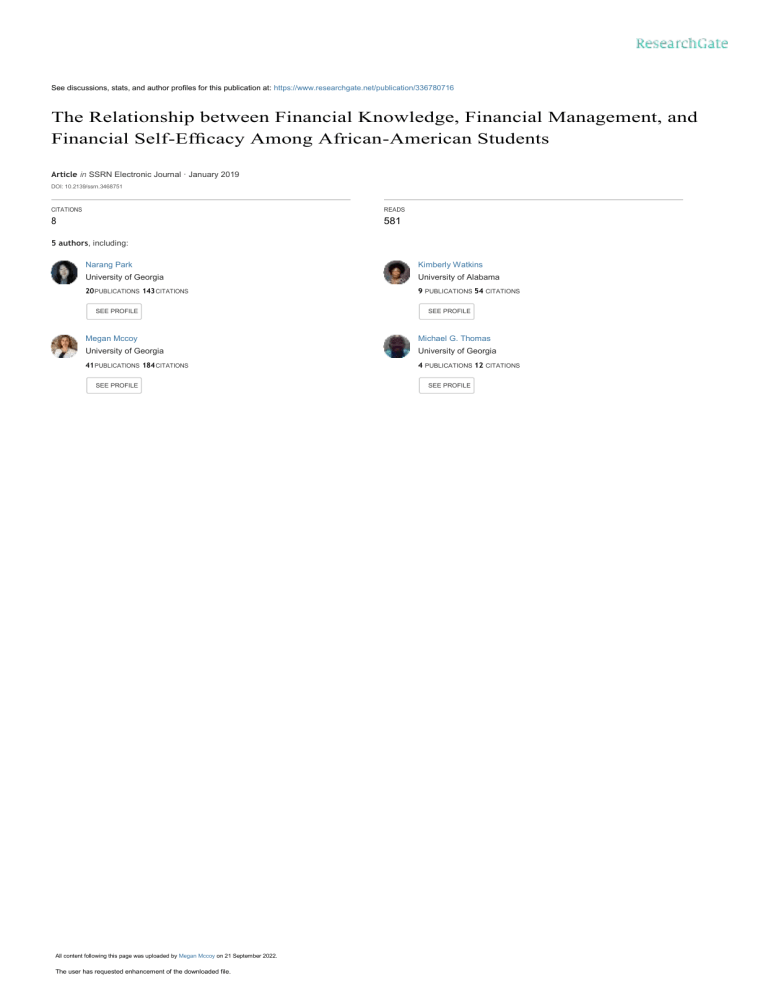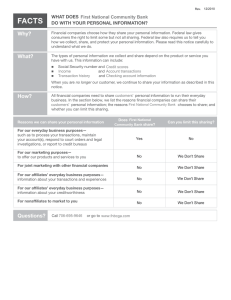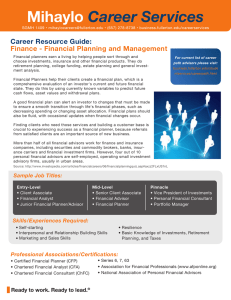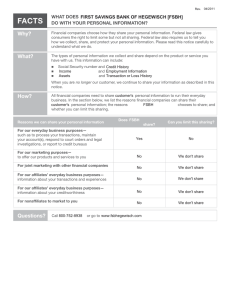
See discussions, stats, and author profiles for this publication at: https://www.researchgate.net/publication/336780716 The Relationship between Financial Knowledge, Financial Management, and Financial Self-Efficacy Among African-American Students Article in SSRN Electronic Journal · January 2019 DOI: 10.2139/ssrn.3468751 CITATIONS READS 8 581 5 authors, including: Narang Park Kimberly Watkins University of Georgia University of Alabama 20 PUBLICATIONS 143 CITATIONS 9 PUBLICATIONS 54 CITATIONS SEE PROFILE SEE PROFILE Megan Mccoy Michael G. Thomas University of Georgia University of Georgia 41 PUBLICATIONS 184 CITATIONS 4 PUBLICATIONS 12 CITATIONS SEE PROFILE All content following this page was uploaded by Megan Mccoy on 21 September 2022. The user has requested enhancement of the downloaded file. SEE PROFILE Financial Services Review 29 (2021) 169–185 The relationship between objective financial knowledge, financial management, and financial self-efficacy among African American students Kenneth Whitea,*, Narang Parkb, Kimberly Watkinsc, Megan McCoyd, Joycelyn Morrise a Department of Financial Planning, Housing, and Consumer Economics, University of Georgia, Dawson Hall, Athens, GA 30602, USA b School of Family and Consumer Sciences, Texas State University, 601 University Drive, San Marcos, TX 78666, USA c Department of Consumer Sciences, University of Alabama, 313 Adams Hall, Box 870158, Tuscaloosa, AL 35487, USA d Department of Personal Financial Planning, Kansas State University, 1324 Lovers Lane, 343M Justin Hall, Manhattan, KS 66502, USA e Department of Teaching and Learning, Florida International University, 11200 SW 8th Street, ZEB, Miami, FL 33199, USA Abstract Research consistently shows the positive associations of objective financial knowledge, management, and self-efficacy on college students’ financial literacy. However, there is a need for a more nuanced examination of the factors contributing to African American college students’ fi- nancial literacy. Using the National Student Financial Wellness Study and structural equation modeling, findings suggest that for African American students, objective financial knowledge is not directly or indirectly associated with financial self-efficacy. Only financial management is significantly associated with increased financial self-efficacy. These findings indicate that expe- riential learning may be effective for improving African American students’ financial literacy. © 2021 Academy of Financial Services. All rights reserved. JEL classification: D10; D14; G53 Keywords: African American; Financial literacy; Financial knowledge; Financial management; Financial selfefficacy *Corresponding author. Tel.: +1-706-542-4879; fax: 706-542-4397. E-mail: kjwhite@uga.edu 1057-0810/21/$ – see front matter © 2021 Academy of Financial Services. All rights reserved. 170 K. White et al. / Financial Services Review 29 (2021) 169–185 1. Introduction Financial knowledge is essential to increase sound financial skills and to reduce financial distress (Asaad, 2015; Huston, 2010; Scott, Vu, Cheng, & Gibson, 2018). Greater financial knowledge leads to healthy behaviors such as budgeting, saving for emergencies, and investing for goals such as retirement (Henager & Cude, 2016). Given the critical nature of these skills, one might assume that researchers understand how financial knowledge develops. However, research is limited by conflicting definitions and unclear paths to its development (Willis, 2008). What researchers do understand thus far is that both understanding and confidence are critical components to developing financial knowledge. Objective financial knowledge is a necessary component of financial literacy. However, to be a financially literate individual, one must also possess self-efficacy, or confidence, in his or her abilities to perform financial tasks (Bandura, 2006). Individuals with higher levels of objective financial knowledge and financial self-efficacy are associated with sound financial management leading to increased financial well-being (Robb & Woodyard, 2011). The link between objective financial knowledge and financial self-efficacy as integral components of financial literacy is evident. So, why has it proven so difficult to teach people these skills? Basic financial education classes should increase knowledge (Mielitz, MacDonald, & Lurtz, 2018) and literacy (Al-Bahrani, Weathers, & Patel, 2019). However, well-intentioned interventions may fall short for African American students. For example, Al-Bahrani et al. (2019) reported the returns on financial education are higher for Whites than persons of color (POC). Huston (2010) concluded that a one-size-fits-all approach to personal financial education is not effective and should instead be tailored to different demographics. If not tailored, financial education in its current form could increase the objective financial knowledge gap between Whites and POC. Although the personal finance literature has extensively documented the effects of objective financial knowledge and financial self-efficacy for college students, the literature is lacking when specifically addressing the roles of objective financial knowledge, financial management, and financial self-efficacy regarding African American college students’ financial literacy (Alhenawi & Elkhal, 2013; Lown, 2011). Whereas many studies use financial literacy as an input variable to explore its influence on financial behavior, the purpose of this article is to explore differences in the paths to financial literacy for African American college students. We seek to examine three paths: (1) the path from objective financial knowledge to financial self-efficacy, (2) the path from objective financial knowledge to financial management, and (3) the path from financial management to financial self-efficacy. Our contribution is a comparison of African American college students to their peers in regards to objective financial knowledge, financial self-efficacy, and financial management experiences. Ultimately the study seeks to understand how African American college students become financially literate individuals. The article is organized as follows: Section 2 introduces the conceptual framework and hypotheses; Section 3 describes the data and measures; Section 4 presents the results; and Section 5 is the discussion, and Section 6 concludes the articl K. White et al. / Financial Services Review 29 (2021) 169–185 171 172 View publication stats K. White et al. / Financial Services Review 29 (2021) 169–185


